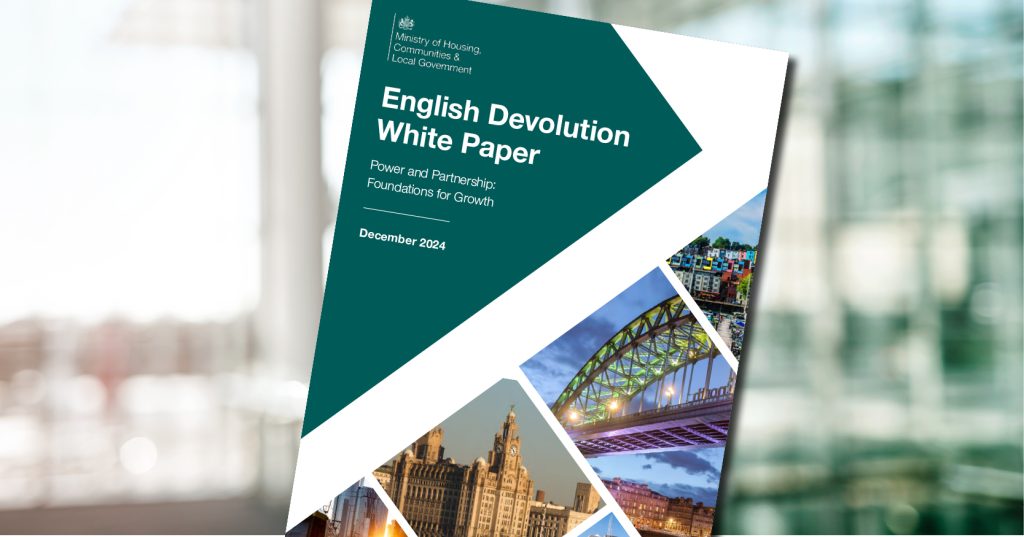
Written by Jo Dancy, Director, Regions
At Labour Party Conference in September 2024, the Government was very clear on its devolution agenda; that it would be coming to everyone (who wanted it), and that it would be progressing fast.
Losing no time at all, in December 2024, the government invited all remaining two-tier areas in England to be restructured into single-tier unitary authorities to facilitate devolution deals. Off the back of the English Devolution White Paper, the Government have now announced the areas which have been accepted onto the Devolution Priority Programme.
Deals Signed, Ballots Left Behind
Last month, 39 councils expressed interest in being part of the new devolution discussions. Now, Angela Rayner has confirmed to MPs that Cumbria, Cheshire & Warrington, Norfolk & Suffolk, Greater Essex, Sussex & Brighton, and Hampshire & Solent have been included in the devolution priority programme. As a result, their 2025 elections have been cancelled to make way for new devolution deals.
The knock-on effect is significant. County council elections scheduled for May in Norfolk, Suffolk, Essex, Hampshire, and East and West Sussex will now be postponed. Elections in Thurrock and the Isle of Wight—where new unitary councils are set to emerge—will also be delayed until next spring. Meanwhile, Surrey has been granted permission to push back its elections.
Kent had hoped to do the same as part of its bid with Medway but has not been included in the priority programme. Similarly, Worcestershire, Warwickshire, and Gloucestershire sought postponements, despite uncertainty over what devolution deal they would ultimately be part of. Under the government’s timetable, areas in the priority programme are expected to establish new strategic authorities in time for mayoral elections in May 2026.
Speaking in Parliament, Rayner described the programme as a “fast-track ticket to drive real change,” stating that if everything goes to plan, over 44 million people—nearly 80% of the country—will see the benefits of devolution at a pace unmatched by any previous government. For councils yet to put forward a proposal, she has made it clear that a legal invitation will be issued to all 21 two-tier areas, outlining the requirements for their unitary authority submissions. Councils expected to be impacted by this announcement include: Hampshire, Isle of Wight, Southampton and Portsmouth, Surrey, Essex, Thurrock, Southend-on-Sea, East and West Sussex, Brighton & Hove, Norfolk and Suffolk, Cumberland and Westmorland & Furness.
Opportunities amid Uncertainty
Having waited patiently for the General Election in 2024, and the publication of the new NPPF, the industry is once again oscillating between longer-term optimism around a more holistic, less NIMBY approach to planning, versus uncertainty over day-to-day dealings with these authorities and whether the market will be paralysed in the meantime.
If we could fast-forward to all unitary re-structuring and devolution deals being in place, I think most would agree that this would be a positive place to be – more local authority funding certainty, efficiencies of services, more regional independence on decision-making and more strategic approach to development and infrastructure planning – happy days! But in the short to medium-term, we are asking a lot from our local authorities on the ground, and we have to hope that they are able to step up to the challenge: ongoing budget and resource issues; further Local Plan Reviews due to (now) mandatory housing target increases; local kick-back to grey-belt release and likely increase in appeals; potential selection as a new town location; and all whilst potentially re-structuring into a unitary authority, managing internal political power struggles, and getting to grips with a new devolution deal and all that that entails.
Of course, there will certainly be great opportunities for agile developers and investors, even within all the relative chaos of the next few years, as long as they navigate the political, policy and authority structural challenges effectively*. But it will be important, in the short-term, for the industry to hold its nerve, maintain momentum, and keep one eye on the bigger picture of devolution and all the positive economic and growth benefits that that will bring to much larger swathes of England.
At Labour Party Conference, Jim McMahon stated, in relation to 51% of local authorities saying that they would go under in the next few years without intervention, that there would be an immediate emergency rescue to “get the car out of the ditch” followed by a “long-term resilience strategy”. Whatever your views on devolution, you can’t argue that the government does seem to be on a mission to retrieve ‘the car’ and set it on steady ground for the future.
So, it may be a challenging and bumpy ride over the next few months and years but, in the words of Robert Schuller, American motivational speaker, and author: “Better to do something imperfectly than to do nothing perfectly.”
*Cue Kanda! To find out more about how we’re supporting clients in the regions, get in touch with us at kandaregions@kandaconsulting.co.uk
